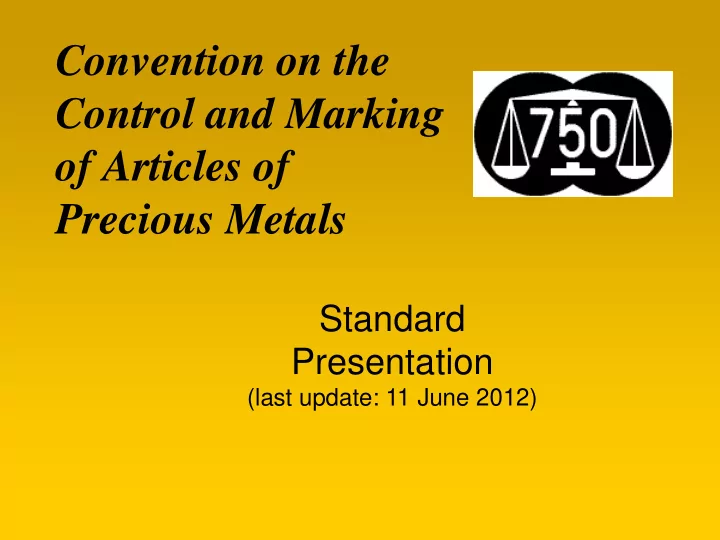

Convention on the Control and Marking of Articles of Precious Metals Standard Presentation (last update: 11 June 2012)
Introduction Daniel Brunner Secretary of the Convention Geneva (Switzerland) info@hallmarkingconvention.org
Overview of presentation -I- What is the Convention ? -II- How does the Convention work ? -III- How to join the Convention ? -IV- What are the benefits ?
Part I What is the Convention ?
Convention = International treaty between States on cross-border trade in precious metals
Put in other words: Free trade area for precious metals articles « Schengen » for precious jellewery and watches
Precious Metals Platinum Gold Silver Palladium (since 2011)
Convention signed in Vienna on 15 November 1972 Also referred to as: Vienna Convention Hallmarking Convention
Originally signed by 7 States Today: 19 Contracting States 4 Applicant States Candidates
Convention Members
Applicants
The Convention in Europe
How is the Convention organised?
Contracting States Standing Committee Chairman Secretariat Standing Technical Group
Governing Principles Dual representation All decisions by consensus Elected Chairman Appointed Secretariat
Meeting in London
Part II How does the Convention work?
Goals of Convention (a) Facilitate international trade (b) Maintain fair trade (c) Protect consumers
Preamble The Republic of Austria, the Republic of Finland, the Kingdom of Norway, the Portuguese Republic, the Kingdom of Sweden, the Swiss Confederation and the United Kingdom of Great Britain and Northern Ireland; Desiring to facilitate international trade in articles of precious metals while at the same time maintaining consumer protection justified by the particular nature of these articles; Have agreed as follows:
How ? Instrument: Common Control Mark System: Third party control
Common Control Mark (CCM) Principle: « Articles marked with the CCM are imported without further testing or marking »
Common Control Mark (CCM) First and only international hallmark / control mark Same legal status as national hallmark / control mark
CCM Statistics + 7,000% between 1977 and 2007!
Common Control Mark (CCM) There are a number of legal & technical requirements in order to apply the CCM
Condition No 1 Articles must be assayed & marked by an authorised Assay Office (Art. 5) Principle of independent third-party verification
Authorised Assay Office Art. 5 (1): “ Each Contracting State shall appoint one or more authorised assay offices for the control and marking of articles of precious metals as provided for in Annex II.”
Condition No 2: 4 minimum marks 7 5 0 CCM Assay Responsi- Fineness Office Mark bility mark mark (control)
Marks
Condition No 3: Fineness must be legal in the country! Convention fineness: Pt: 999, 950, 900, 850 Au: 999, 916, 750, 585, 375 Ag: 999, 925, 830, 800
Fineness Art. 1 (2): “ Nothing in this Convention shall require a Contracting State to allow the importation or sale of articles of precious metals which are not defined in its national legislation or do not comply with its national standards of fineness .”
Condition No 4: Responsibility mark must be registered in the country applying the CCM – not in the importing country!
Part III How to join the Convention ?
Conditions 1. Only a State can join 2. Must be recognised (United Nations) 3. Hallmarking system
Hallmarking System « Arrangements for the independent assaying and marking of articles of precious metals » - - > compulsory (e.g. UK) - - > voluntary (e.g. Sweden) - - > mixed (e.g. CH)
Arrangements = Legislation + Organisation
Legislation - Law on precious metals - Law protecting marks against fakes & forgeries
Organisation = Assay Office + Laboratory
Membership Procedure Membership application Inspection Invitation Ratification
Part IV What are the benefits ?
Main benefits Export facilitation Fair & flexible system Harmonisation of standards Competitivity
Export facilitation The Convention eliminates trade barriers and red tape The CCM (symbol of quality) favours exports
Fair & flexible system All operators are treated equally Win – Win for trade & consumers (All benefit!) CCM is purely voluntary
The Convention harmonises * Control & marking (uniform) * Standards : Convention = first & only international agreement regulating precious metals (see also CIBJO Blue Book)
Competitivity (i) It gives Convention countries a competitive advantage in terms of market location (ii) It increases competition between Assay Offices ( € , h, service) (iii) It gives CCM articles an advantage in terms of marketing & quality
Networking
To conclude…
CCM = Passport to …
www.hallmarkingconvention.org
Documents * Convention & Annexes * Schedules * Compilation of Acts * Information Brochure
THANK YOU FOR YOUR PRECIOUS ATTENTION ! All that glitters is not gold
Recommend
More recommend